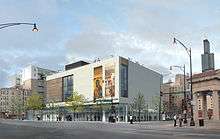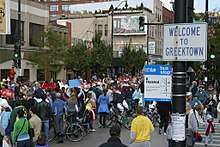Greektown, Chicago
Greektown is a social and dining precinct, located on the Near West Side of the United States' city of Chicago, Illinois. The precinct consists of mainly restaurants and businesses, as well as cultural sites and events.

The precinct can be found on Halsted Street, between Van Buren and Madison Streets.
History

The first Greek immigrants to settle in Chicago arrived in the 1840s via the Mississippi and Illinois rivers. The major fires of Chicago in 1871 caused significant further quantities of Greek immigrants to move to the area, inspired by the prospect of rebuilding the town of Chicago.[1]
The original Greektown precinct on Halsted Street began with the Jane Addams Hull House, which acted as a meeting point for the Greek population within Chicago and provided a basis for community to be built from 1889. This house was used as a hub for the Greek community, and saw further small business expand within this area, despite small numbers, with 245 Greek people reported as living in Chicago, who were noted as predominantly young men of lower socio-economic background.[2] This saw a slow expansion of restaurants, and various other stores throughout the century, with the Chicago tribune reporting in 1895 that ‘the Greeks have almost run the Italians out of the fruit business in Chicago not only on a small retail way, but as wholesalers as well’.[2]
Attempts to unite the various Greek restaurants in the area as well as the wider city were made with the establishment of ‘Hermes’, a Greek business group in 1910. This group initially failed to gain traction amongst business owners. In the longer term, however, it united the Greek community, writing bylaws for its member businesses and organising social events, laying the framework for current regulatory bodies such as the Greektown organisation.[2]
By 1930, the area which had become known as the ‘Greek Delta’, held a foreign and native-born population of over 30,000.[1] This population continued its growth and expansion with the precinct growing in size and area. This continued until 1960, when the opening of the University of Illinois Chicago campus, as well as the construction and opening of the Eisenhower Expressway, forced the precinct to move North along Halsted street to its location between Van Buren and Madison streets. The majority of functioning organisations and restaurants operating within the Greektown precinct opened within the 1970-1990 period following relocation to the precinct’s space between Van Buren and Madison streets. [3]
The onset of the global COVID-19 pandemic in early 2020 saw bars and restaurants within the precinct close for business and events either postponed or cancelled due to public-health related Illinois state laws.[3]
Transportation
Greektown is easily accessible via public transportation by riding the Chicago "L"'s Blue Line to the UIC-Halsted station and heading north, or via the #8 Halsted bus route.
Events
There are various events occurring in the Greektown precinct, varying in scale from weekly to annually.
‘A Taste of Greektown’ is an annual culinary and cultural event held within the Greektown precinct, held in the month of August.
The stated aim of the festival is to combine ‘old world traditions with 21st century freshness’ in the Greek cuisine, through the use of local neighbourhood food producers and vendors. The event additionally offers entertainment through Greek bands and entertainment, as well as games for children. This event Is held between Adams Street and Van Buren street on 315 South Halsted street. This event saw the 30th anniversary of its founding occur in 2019.[7]
The Greektown precinct organisation also offer various events which occur on a more regular basis, such as monthly Greek dancing classes. Many events scheduled for early 2020, however, such as the ‘12th District CAPS meeting’ for citizens to raise queries and concerns with local police, were either cancelled or postponed due to restrictions surrounding the COVID-19 pandemic.[3]
Cultural Sites
The prominent cultural site within the Greektown precinct is the National Hellenic Museum, situated on 333 South Halsted street.
This museum was established initially in 1983, with its new facility on Halsted street officially opened in 2011.[8] The museum states its purpose as depicting and upholding the legacy of Greek culture within the United States through education. In its depiction of the Greek experience and legacy within the united states, the museum utilises over 20,000 resources. These include texts, artefacts, photographs and newspapers, as well as over 400 recorded accounts. The museum receives regular visits organised through the ‘Office of Tourism’s Chicago Neighbourhoods’ program, as well as over 10,000 public school students from Chicago every year.[8]
The museum regularly updates and introduces exhibits, such as the ‘Reaching for the American Dream: The Greek Story in America’ exhibit, gifted by Angela G Paterakis. This exhibit, through utilising firsthand accounts, photographs and artefacts, traces the story of Hellenic culture and its integration into the USA through involvement in major historical events, and establishing businesses and communities. The museum has also taken over exhibits from other museums, such as the Cyprus Museum of Jackson Florida’s entire collection, which included artefacts numbering over 300.[9]
Strategic Plan
The strategic plan for the Greektown precinct is a document outlining the intended future plan of business operations for the Greektown precinct, compiled by the Lakota group. This process began on December 1, 2017 with surveys, interviews and reviews amongst local businesses and stakeholders. This was followed by more canvassing and stakeholder consultancy, with the final Strategic plan published in March 2019.[3]
The overarching purpose behind this plans publication is to outline a clear path for continued economic sustenance for the Greektown district, whilst ensuring that its heritage and cultural significance for the Greek community is not diminished. It is a 123-page document, outlining intentions to ‘enhance Greektown as a compelling cultural destination’, a ‘vibrant business district’ and as a ‘prosperous and collaborative neighbourhood’. [3]
The report also states its intended methods to achieve these goals, including storefront and façade decoration enhancements, as well as prioritising various ‘action items’ in order to increase public engagement with the precinct, such as the introduction of a year long calendar, detailing planned events and promotions within the precinct. These activities have been designed whilst considering the propensity for property ownership and prices, as well as zoning to change in the future.[3]
References
- Kopan, A (1989). "The Greeks of Chicago: The Survival of an Ethnic Group through Education". Journal of the Hellenic Diaspora. 16(4): 47–60 – via JSTOR.
- Demas, L (2004). "Immigrant Entrepreneurs and the Formation of Chicago's 'Greektown' 1890-1921". The Journal of Modern Hellenism. 21-22: 105–149 – via JSTOR.
- "Welcome to Greektown Chicago- Our culture. Your adventure". Greektown Chicago. 2020.
- http://chicago.eater.com/2016/9/7/12835928/parthenon-chicago-greek-closed-flaming-cheese-opa
- http://abc7chicago.com/food/parthenon-restaurant-closes-after-48-years-in-greektown/1502411/
- "Archived copy". Archived from the original on 2016-11-07. Retrieved 2016-11-06.CS1 maint: archived copy as title (link)
- Kokkinidis, T (2019). "Thousands Celebrate Greek Food and Culture at Chicago's "Taste of Greektown" Festival". USA Greek Reporter.
- "National Hellenic Museum". www.nationalhellenicmuseum.org. Retrieved 2020-05-29.
- "Greek Story in America gifted by Angela G Paterakis". www.nationalhellenicmuseum.org. Retrieved 2020-05-29.